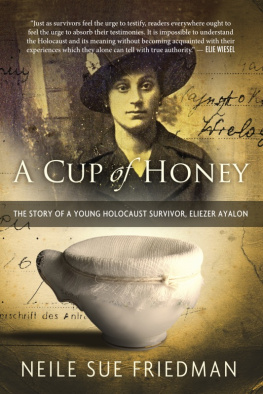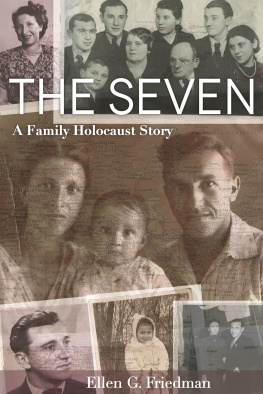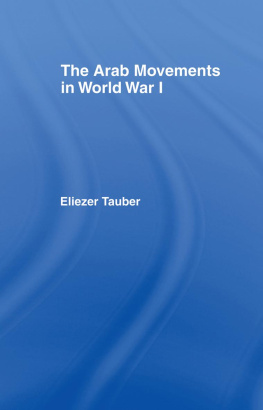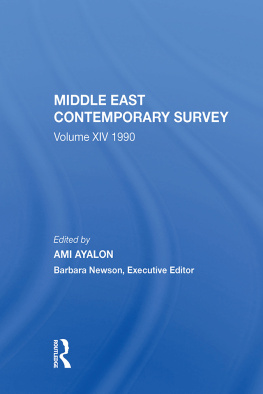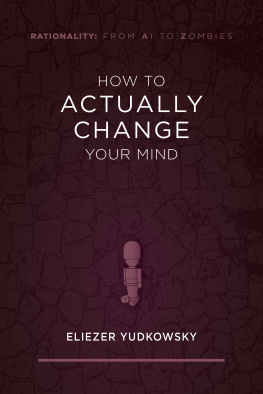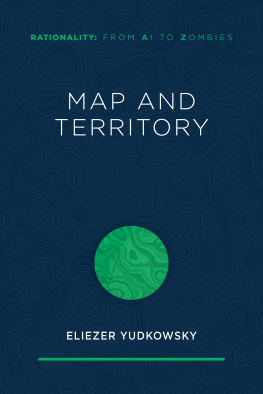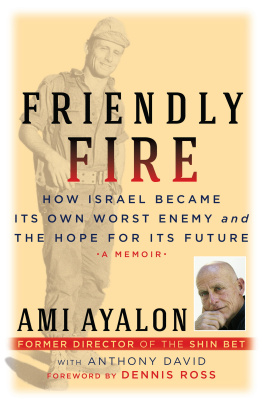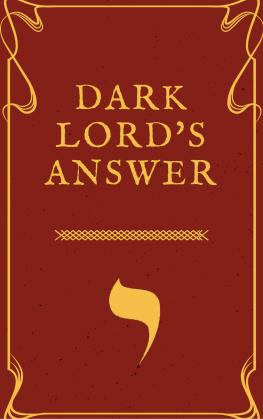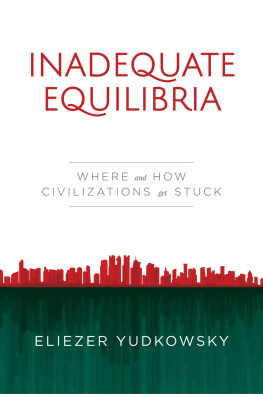Copyright 2015 by Neile Sue Friedman and Eliezer Ayalon
All rights reserved. Published in the United States of America. No part of this book may be reproduced or transmitted in any form or by any means, graphic, electronic, or mechanical, including photocopying, recording, taping or by any information storage or retrieval system, without the permission in writing from the publisher.
This edition published by SelectBooks, Inc.
For information address SelectBooks, Inc., New York, New York.
First Edition
ISBN 978-1-59079-365-7
eISBN 978-1-59079-330-5
Manufactured in the United States of America
10 9 8 7 6 5 4 3 2 1
Contents
We dedicate this book to the blessed memory of Elis family, who perished in the Holocaust:
Elis parents, Rivka Leah and Israel Hershenfis; his brothers, Mayer Munish and Abush Wolf Hershenfis; and his sister, Chaya Branka Hershenfis.
We also dedicate this book to both of our families, in the United States and Israel, whose support has been invaluable:
Anna Friedman, Lily Friedman, Joseph Friedman and John Friedman; and Neiles husband, Steve Eisner, author and owner of When Words Count Writers Retreat in Rochester, Vermont, who inspired us to republish the book two decades after it was first published in order to keep the story alive; and
Rivka Ayalon, Ofer and Hannah Ayalon, Nurit and Yaacov Atar, Gil and Keren Ayalon, Yifat Ayalon Elkayam, Neta and Yoni Mor, Omri Atar, Almog Atar, Yuval and Liam Elkayam, Mia Ayalon and Noa and Nadav Mor.
In our children, grandchildren and great-grandchildren we see the bright future of the Jewish people, linked to memories of the past.
NEILE SUE FRIEDMANS legal career has spanned nearly three decades. As an administrative law judge for the State of Maryland for almost twenty years, Neile hears and decides cases for dozens of state government agencies that have a meaningful daily impact on peoples lives. Her experience writing A Cup of Honey reminds her every day of the consequences to individuals when governments improperly restrict civil rights. This perspective guides Neiles work, and helps to ensure that agency decisions are just.
Previously Neile worked for ten years as an assistant attorney general, serving as counsel to the State of Maryland in its efforts to develop and implement water pollution prevention programs to clean up the Chesapeake Bay, and as prosecutor of violators of our clean air and water acts and laws for disposal of hazardous waste.
Neile, who has three grown children, Anna, Lily, and Joseph, lives in Baltimore. She is married to Steve Eisner, who runs a writers retreat in Rochester, Vermont.

We would like to acknowledge the following family members, friends, colleagues and organizations, both in Israel and in the United States, without whose help and encouragment this project would not have been realized: Dr. Eyal Bor; Judge Aaron Cohn; Michael Drukman; Lynn Flaisher; Vena Gibbs; E. Scott Johnson; Scott A. Johnson; Diane Kempler; Jill Kneerim; Yocheved Henriques Koplowitz; Elanore Lampner; Elizabeth Landon; Lyndsey Layton; Pola Mandelbaum; Jerry Molen; Marcia Moylan; Shamai Perlman; Jezyk Rosenberg; Marcy Silver; Jacqueline and Robert Smelkinson; Anne Marie Stein; Marc B. Terrill; David and Carolyn Thaler; Beverly Wolpert; Moshe Yanover; Yad Vashem Archives, Jerusalem; The Central Zionist Archives, Jerusalem; The Youth Immigration Department of the Jewish Agency for Israel; The United Jewish Appeal; The Radom House; THE ASSOCIATED: Jewish Community Federation of Baltimore; The Jewish Federation of Greater Dallas; The Combined Jewish Philanthropies of Boston; The Los Angeles Jewish Federation.
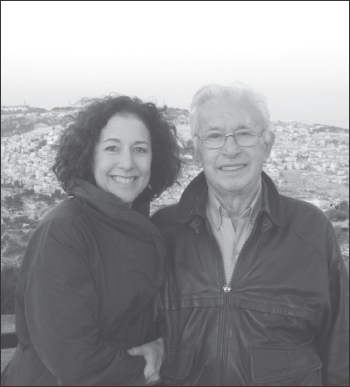
Neile Sue Friedman and Eliezer Ayalon
A sealed room in Jerusalem. January, 1991. I am no longer a child I have children myself even grandchildren. The War ended many years ago.
My childhood years were trapped inside sealed places. Closed off streets. A walled ghetto. Sealed borders. Bolted boxcars. Barracks, locked. Camps guarded with machine guns. Barbed wire fencing, electrified.
A gas chamber. Sealed tight. Very dirty. Cold. Dark.Yelling outside. Loud wailing inside. Mothers clinging to their small children, trying to soothe them. Not to worry, my little one. Mama is holding Chaya, protecting her.Tears fall effortlessly from desperate eyes. Bodies tremble uncontrollably in fright. In my imagination they cling to each other until the end.
Has my home in Jerusalem become a gas chamber? Impossible. We have an army. A government. The world would not let a madman suffocate us with gas fumes. It happened already, a long time ago, and the world learned a lesson. Never again, we said.
I watch the healthy, confident face of my small grandson. It is 2:00 in the morning, and he is sitting in a corner of the sealed room, with his gas mask on. He plays happily with a fire engine, making siren noises. It is hard to hear him. The mask makes him sound like he is in a barrel. Trapped in the barrel. He is not afraid. He feels lucky to be up 1ate.The real siren the air raid siren is loud. It rings in my ears. I cover my ears to make the sound go away.
My inother would hold me in her arms. She would whisper to me. With Gods will, she would say, everything will be all right. I want to see Mamas face. Her smile. Her comforting eyes.
Gas masks. We each have been provided with one. My family look like insects in them. Like insects caught in a trap. Flies. Gigantic ones. In a few moments the air will run out.The gas will fill the room like a big yellow cloud. Each breath will make us dizzy. We will panic. Our faces will contort. We will try to breathe, but no air will enter our lungs. We will begin to climb the walls. To try to escape. We cant escape the room is sealed.
This is not rational, of course. Our government has prepared us well for this nightinare. The room is sealed with a special plastic to keep the gas out. Door openings are sealed with wet rags and thick tape.This is the opposite of a gas chamber. The gas masks will protect us from the harmful effects of any gas that might sneak inside from the Jerusalem hills. We enjoy all the modern defenses against gas attacks. We have a television cable television. A radio. Up-to-the-minute news bulletins. Bottles of pure mineral water.This is 1991. I am in Jerusalem. We are perfectly safe inside this sealed room it shelters our pale faces and trembling bodies.
I refuse to put on my gas mask. My wife is angry with me. So is my pregnant daughter. They cannot persuade me to do it. Not that it would be uncomfortable. The experts made sure the fit was perfect. Not that I would not know how to use it. We have been trained well, and have practiced. We even joked about it. People wear gas masks to clean up chemical spills. We have seen that in the evenings on CNN.

